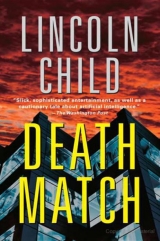
Текст книги "Death Match"
Автор книги: Lincoln Child
Соавторы: Lincoln Child
Жанр:
Триллеры
сообщить о нарушении
Текущая страница: 25 (всего у книги 26 страниц)
SIXTY-TWO
A thousand feet above the streets of Manhattan, the chamber trembled as countless devices shrieked, pressed beyond their electromechanical capacities, spitting sparks and belching ever darker gouts of smoke. Even from where Lash stood – in relative quiet at the center of the hive-mind – the surrounding sound and vibration were terrifying. He coughed. Sweat was running freely, and his shirt was plastered against his shoulder blades. The shaking had grown so intense it almost seemed the penthouse would rip itself free from its supports and tumble earthward. And as he looked at the surrounding faces – Tara, staring intently at the ancient computer; Silver, desolated and in shock; Mauchly, dabbing at his forehead with a handkerchief – Lash felt that would almost be preferable to waiting here while death slowly approached.
The others began to return. First, Sheldrake, shaking his head to indicate he’d found no alternate escape route. Then Dorfman and Lawson, who reported that, as expected, the backup generator and its power conduits were impervious to any attack they could mount. Last came Gilmore, soot-blackened and wheezing, to say that – while the sprinklers in the upper floors of the penthouse could be jury-rigged – the task would take an hour, maybe more, and would probably be insufficient to quell the dozens of fires that were now sprouting up all around them.
“An hour,” Sheldrake said through gritted teeth. “We’re lucky if we have ten more minutes. It’s got to be a hundred and twenty in here, at least. Those battery cells could go at any time.”
Nobody had a response to this. The air was growing so hot, the smoke so thick, Lash found it nearly impossible to breathe. Each time he drew in air, sharp needles filled his lungs. He felt his head grow light, his concentration slip.
“Just a minute,” Tara said. She had stepped forward and was standing directly before the control surface of the IBM 2420. “These buttons. Each one is labeled with an assembly language mnemonic.”
When there was no response, she looked over her shoulder at Silver. “Isn’t that right?”
Silver coughed, nodded.
“What are they used for?”
“Diagnostics, mostly. If a program didn’t work, you could step through the opcodes, sequentially.”
“Or enter new instructions by hand.”
“Yes. They’re an anachronism, a holdover from an earlier design.”
“But they do allow access to the accumulator? The registers?”
“Yes.”
“So we could run a short instruction set.”
Silver shook his head. “I’ve already told you. Liza’s defenses won’t accept any new programming. Any input from the card reader or keypunch would activate a security alert.”
“But I’m not talkingabout entering a program.”
Now Mauchly turned to look at Tara.
“We wouldn’t input anything from a peripheral. We’d punch in a few opcodes, right here. Five – no, four – should be enough. We’d just run those four opcodes, over and over.”
“What four opcodes are those?” Silver asked.
“Fetch the contents of a memory address. Run a logical AND against those contents. Update the memory address with the new value. Then increment the counter.”
There was a silence.
“What’s she talking about?” Sheldrake asked.
“I’m talking about accessing the computer’s memory in the most primitive way. Byte by byte. Doing it manually, from the computer’s own front panel.” Tara glanced back at Silver. “The 2420’s an eight-bit machine, right?”
Silver nodded.
“Every location, byte, in the computer’s memory has eight bits. Okay? Each of those bits can have one of only two values: zero or one. Together, those eight binary numbers make up a single instruction, a word in the computer’s language. I’m talking about zeroing outall those instructions. Leaving the computer blank. Instructionless.”
Sheldrake frowned. “How the hell could you do that?”
“No, she’s right,” said Dorfman, the security tech. “You could ‘AND’ a zero byte against each memory location, in turn. It’s almost elegant.”
Sheldrake turned to Mauchly. “You know what they’re talking about?”
“AND is a logical instruction,” Dorfman went on. “It compares each bit to a value you furnish, and either leaves that bit alone or swaps its value, depending.”
“It’s simple,” Tara added. “If you AND a zero to an existing zeroin memory, it leaves it alone. But if you AND a zero to an existing onein memory, it changes it to a zero. So with the simple instruction—‘AND 0’—I can change anymemory location to zero.”
“And that would leave you with NOPs,” Mauchly said, nodding.
“No Operation.” Dorfman’s voice rose with excitement. “Precisely. Leaving the computer’s memory full of empty instructions.”
“It wouldn’t work,” Silver said.
“Why not?” Tara asked.
“I’ve already explained. There are a dozen virtual simulacra of this machine, running elsewhere in Liza’s consciousness. They’re compared to each other every thousand machine cycles. They’ll see the new programming and ignore the original computer.”
“That’s just the point,” Tara said with a cough. “We’re not introducing any new programming. We’re just resetting the computer’s memory. Manually.”
“Out of the question,” said Silver.
Lash was surprised by the sharpness of Silver’s answer. For what seemed a long time – since Liza had gone silent, perhaps even before – Silver had acted defeated. Resigned. But now, there was a fierceness in his voice Lash hadn’t heard since their first confrontation.
“Why?” Tara asked.
Silver turned away.
“Can you tell me for sure– for sure—that you took that specificpossibility into account when you coded the security protocols?”
Silver folded his arms, refusing to answer.
“Isn’t there a chance that zeroing Liza’s original memory will abort this self-destructive behavior? Or, at the very least, cause a system crash?”
Again, the question hung in the air. And now, for the first time, Lash made out a large gout of open flame – ugly orange against the black smoke – flaring up from a rack of equipment near the far wall.
“Dr. Silver,” Mauchly said. “Isn’t it worth a try?”
Silver turned slowly. He looked surprised to hear Mauchly voice such a question.
“Hell with it,” Tara said. “If you won’t help me, I’ll do it myself.”
“Can you program this thing?” Lash asked.
“I don’t know. Legacy IBM assembler didn’t change that much from machine to machine. All I can tell you is I’m not going to stand around, waiting to die.” And she stepped up to the archaic control surface.
“No,” said Silver.
All eyes turned toward him.
He’s not going to let her do it, Lash thought. He’s not going to let her stop Liza. He watched, transfixed, as the man seemed to wage some desperate inner battle.
Ignoring him, Tara raised her hands toward the row of buttons.
“ No!” Silver cried.
Lash took an instinctive step forward.
“You need to deal with the parity bit first,” Silver said.
“Sorry?” Tara asked.
Silver fetched a deep breath, coughed violently. “The 2420 has a unique addressing scheme. The instructions have nine bits instead of the usual eight. If you don’t mask out the parity bit as well, you won’t get the empty instruction you want.”
Lash’s heart leapt. Silver’s getting on board, after all. He’s going to help.
Silver walked to a nearby teletype, snapped it on, threaded the attached spool of paper tape into the plastic guide of the reader. Then he moved behind the main housing of the 2420, his step increasingly decisive.
“What are you doing?” Tara asked.
Silver knelt behind the housing. “Making sure this computer will still respond to manual input.”
“Why?”
Silver’s head reemerged above the housing. “We’re only going to get one chance at this. If we fail, she’ll adapt. So I’m going to dump the current contents of her memory to paper tape.”
Tara frowned. “I thought you said you didn’t have any back doors.”
“I don’t. But there are a few early diagnostic tools, hard-wired, no hacker could ever have any use for.” Silver ducked back behind the housing. A moment later, the teletype came to life. The faded spool of tape began moving through the machine punch. A shower of thin yellow chads rained down onto the floor beneath.
Within a minute, the process was complete. Silver pulled an extra length of bare tape through the punch, ripped it away. He ran the tape through his fingers, scanning it. Then he nodded. “It appears to be a successful memory dump.”
“Then let’s get on with it.” Behind Tara, more gouts of flame were rising, and her dark hair was backlit with angry flames.
Silver folded the tape and stuffed it in his pocket. “I’ll give you the opcodes. You enter them.”
Tara raised her hands again to the control surface.
“Press the LDA button to load the first memory location into the register.”
Tara complied. Lash saw a tiny light illuminate beneath her finger.
“Now move to that panel of nine toggle switches. Enter ‘001111000.’ That’s 120 in decimal, the first available memory location.”
Tara ran her finger down the row of toggle buttons.
“Now press the execute button.”
A small light glowed green on the panel. “Done,” she replied.
“Now press the ADD button.”
“Done.”
“On the toggle switches, enter ‘100000000.’
“Wait. That ‘one’ at the beginning will screw everything up.”
“The parity bit, remember? It has to stay set.”
“Okay.” Tara ran her hands over the buttons again. “Done.”
“Press the execute button to ‘AND’ the zeros to memory location 120.”
Another press of a button; another confirmation.
“Now press the STM button to store the new value in memory.”
Tara pressed a button at the end of the row. Nodded.
“Now press INC to increment the memory pointer.”
“Done.”
“That’s it. You’re ready for the next set. You’re going to have to press those four buttons – LDA, ADD, STM, and INC – in order, executing the sequence each time, over and over until you reach the end of memory.”
“How many memory locations in all?”
“One thousand.”
Tara’s face fell. “Jesus. We’ll never have time to erase them all.”
There was a terrible pause.
“Oh. Sorry.” It was Silver speaking again. “I meant, one thousand in octal.” The smile that followed was even more ghostly than before.
“Base eight,” Tara muttered. “What’s that in base ten?”
“Five hundred twelve.”
“Better. But it’s still a hell of a lot of button-pressing.”
“Then I suggest you get started,” Mauchly said.
They worked as a team – Dorfman keeping track of the iterations, Tara punching in the opcodes, Silver checking her entries. Gilmore, the security tech, was dispatched to the exit hatchway, instructed to alert them if he observed any stand-down from Condition Gamma. Lawson was ordered to keep a clear avenue of escape between them and the interstructural hatch – just in case they succeeded.
They closed ranks around the little computer as the heat and smoke pressed in ever more fiercely. The air thickened, until Lash could barely see the figures around him. His eyes were streaming freely, and his throat was so parched by the acrid smoke that swallowing became all but impossible. Once or twice, Sheldrake disappeared in the direction of the backup generator and its lethal payload; each time he returned, his expression was grimmer.
At last, Tara stepped away from the control surface, flexing and unflexing her fingers.
Dorfman nodded. “Check. That’s five hundred and twelve.”
Lash waited, heart hammering in his chest, for something to happen.
Nothing.
He felt his skin scorching in the heat. He closed his eyes; felt the earth begin to tilt dangerously; opened them quickly again.
Sheldrake picked up his radio. “Gilmore!”
There was a crackle of static. “Yes, sir!”
“Anything happening?”
“No sir. Status quo here.”
Sheldrake slowly lowered the radio. Nobody spoke, or even dared look at one another.
Then the radio chirped back into life. “Mr. Sheldrake!”
Sheldrake instantly raised it. “What is it?”
“The security doors – they’re opening!”
And now Lash could feel a faint vibration beneath his feet: nearly lost amid the death throes of the machinery, but discernible nevertheless.
“Power?” Sheldrake almost yelled into the radio. “Is there power down there?”
“No, sir, I don’t see anything yet – just the lights of the city, shining through the baffle. Jesus, they look good—”
“Hold your position. We’re on our way.” He turned toward the group. “Standing down from Condition Gamma. Looks like we did it.”
“Tara did it,” Mauchly said.
Tara leaned wearily against the panel.
“Come on,” Mauchly said. “No time to lose.”
He began leading the way out through the heavy palls of smoke. Lash took Tara gently by the arm and fell into step behind Sheldrake. Glancing back, he was surprised to see Silver was not following. Instead, the man was threading his paper tape back into the teletype.
“Dr. Silver!” he shouted. “Richard! Come on!”
“In a minute.” The teletype came to life, and the paper tape began threading through the reader.
“What the hell are you doing?” Tara cried. “We have to get out!”
“I’m buying us some time. Don’t know how long your scheme’s going to work – Liza’s bound to notice an irregularity soon. So I’m restoring the original programming to cover our tracks.”
“You’re wasting time – come on!”
“I’ll be right behind you.”
“Let’s go.” And as Lash ducked between viscous curtains of black, he caught one more glimpse of Silver: bending intently over the teletype, guiding the tape back through the reader.
The walk was a nightmare of fire and smoke. What on their way in had been a digital city in overdrive was now a silicon inferno. Cascades of sparks spat, tongues of flame arced overhead; steel behemoths tore themselves apart as their internals expired in jets of burning machine oil. The shriek of failing metal, the bolts exploding under enormous heat, turned the huge chamber into a war zone. The pall grew even thicker as they moved outward through the rings of support equipment. Once, Lash and Tara grew disoriented and strayed from the group, only to be tracked down by Lawson. Later, when Tara became separated in a particularly fiery passage, Lash somehow managed to find her after a frantic ninety-second search.
They stumbled on. A dark mist gathered before Lash’s eyes: a mist that had nothing to do with the smoke.
Then – just as he felt he would succumb to the heat and fumes – he found himself in a small, cramped passage with the others. A metal ladder was anchored to a hatch in the floor. Sheldrake was already descending, flashlight in hand, shouting out to an invisible Gilmore below. Mauchly helped Tara onto the ladder next, then Dorfman – who carried another light – and then Lash.
“Watch your step,” Mauchly said, guiding Lash’s hand onto the railing. “And move quickly.”
Lash began descending the ladder as quickly as he could. He climbed through a vertical steel cylinder – the structural undercarriage of the penthouse – and emerged into a strange, twilight world. Despite everything, he paused for a moment. He’d heard mention of the “baffle,” the open area between the inner tower and the penthouse. Faint lights of the city filtered in from the surrounding latticework. Here, the metallic shrieking of the computing chamber was faintly muffled. Below, flashlights lanced their way through the gloom.
“Dr. Lash,” came Mauchly’s voice. “Keep moving, please.”
Just as Mauchly spoke, Lash made out the thick plates of steel that lay, accordion fashion, against the transverse walls of the baffle. They gleamed cruelly in the reflected light, like monstrous jaws. The security plates, he thought as he resumed his descent.
A minute later he was standing on the access pad atop the inner tower. Nearby was another open hatch, this one leading into the tower itself. He was safely below the security plates: from here, the underside of the penthouse was almost invisible in the thick air above. He felt Tara grasp his hand. For a moment, sheer relief washed away every other emotion.
And then he remembered: they were still short one person.
He turned to Mauchly, just now stepping off the ladder. “Where’s Silver?” he asked.
Mauchly raised his cell phone, dialed. “Dr. Silver? Where are you?”
“I’m almost there,” came the voice. Behind it, Lash could hear a terrible fugue of destruction: explosions, collapses, the groan of failing steel. And there was another noise, mechanical and regular, scarcely discernible: the sound of the tape reader, still chattering grimly on…
“Dr. Silver!” Mauchly said. “There’s no more time. The place could go up at any moment!”
“I’m almost there,” the voice repeated calmly.
And then – with a sudden, awful lucidity – Lash understood.
He understood why Silver abruptly acquiesced to Tara’s plan for erasing Liza’s memory, after resisting so fiercely. He understood the real reason Silver spent the time to get a memory dump onto tape. And he thought he understood why Silver remained behind. It wasn’t to buy time to see everybody out safely – at least, that wasn’t the only reason…
I’m almost there.
Silver didn’t mean he’d almost reached the exit. He meant he’d almost finished reloading Liza’s core memory. Keeping her terrible plan in motion.
Lash grasped the ladder. “I’m going back for him.”
He felt Mauchly grab hold. “Dr. Lash—”
Lash brushed the hand away and began to climb. But even as he did so there was a great clank of turning metal. Overhead, the security plates began to close again.
Lash took another step upward, felt Mauchly restrain him. And now Sheldrake and Dorfman came up, preventing him from climbing further. Lash whirled, grabbed Mauchly’s phone.
“Richard!” he cried. “Can you hear me?”
“Yes,” came the voice, faint and garbled amid the banshee howl. “I can hear you.”
“ Richard!”
“I’m still here.”
“Why are you doing this?”
There was a squeal of interference. Then Silver’s voice became audible again. “Sorry, Christopher. But you said it yourself. Liza’s a child. And I can’t let a child die alone.”
“Wait!” Lash yelled into the phone. “Wait, wait—!”
But the security plates closed with a monstrous boom; the phone died in a shriek of static; and Lash, closing his eyes, slumped back against the ladder.
SIXTY-THREE
Although it is three in the morning, the bedroom is bathed in merciless light. The windows facing the deck of the pool house are rectangles of unrelieved black. The light seems so bright the entire room is reduced to a harsh geometry of right angles: the bed, the night table, the dresser…
Only this time, the bedroom isn’t that of a victim. It’s familiar. It belongs to Lash.
Now he moves around the room, flicking off switches. The brilliant light fades and the contours of the room soften. Slowly, the nocturnal landscape beyond the windows takes form, blue beneath a harvest moon. A manicured lawn; a pool, its surface faintly phosphorescent; a tall privet hedge beyond. For a minute he fears there are figures standing in the hedge – three women, three men, now all dead – but it is merely a trick of the moonlight and he turns away.
Beyond the bed, the bathroom door is ajar. He drifts toward it. Within, a woman stands before the mirror, brushing her hair with long languid strokes. Her back is to him but the set of her shoulders, the curve of her hips, is instantly recognizable. There is a faint crackle of static electricity as the brush glides through her hair.
He looks into the mirror and his ex-wife’s reflection stares back.
“Shirley. Why are you here?”
“I’m just back to collect a few things. I’m going on a journey.”
“A journey?”
“Of course.” She speaks with the authority of dreams. “Look at the clock. It’s past midnight, it’s a new day.”
The brushing sound has now morphed into something else: something slow, rhythmic, like regular pulses of static from a radio. “Where are you going?”
“Where do you think?” And she turns to face him. Only now it is Diana Mirren’s face looking into his. “Every day is a journey.”
“Every day is a journey,” he repeats.
She nods. “And the journey itself is home.”
As he stares, he realizes something else is wrong. The voice isn’t Diana’s. And it is no longer his ex-wife’s. With a shock that is not quite horror, he realizes it is the voice of Liza. Liza, speaking through Diana’s face.
“Silver!” he cries.
“Yes, Christopher. I can hear you.” The dream-figure smiles faintly.
The strange rhythmic sound is louder now. He hides his face. “Oh, no. No.”
“I’m still here,” Liza says.
But he will not look up, he will not look up, he will not look up…
“Christopher…”
Lash opened his eyes to darkness. For a moment, in the black night, he thought himself back in his own bed. He sat up, breathing slowly, letting the rhythmic rise and fall of the nearby surf wash away the tattered pieces of his dream.
But then the exotic midnight scent of hyacinth blossoms, mingled with eucalyptus, drifted through the open window, and he remembered where he was.
He slowly rose from the bed, drew aside the gauzy curtain. Beyond, the jungle canopy ran down to the tropic sea, a dark-emerald blanket surrounded by liquid topaz. Thin clouds drifted across a swollen moon. Sometimes, he reminded himself, dreams are just dreams, after all.
He returned to bed, gathered up the sheets. For a few minutes he lay awake, gazing at the bamboo ceiling and listening to the surf, his thoughts now in the past and half a world away. Then he turned over, shut his eyes once more, and passed into dreamless slumber.








